
Dianne Emiel Feinstein was an American politician who served as a United States senator from California from 1992 until her death in 2023. A member of the Democratic Party, she served as mayor of San Francisco from 1978 to 1988.

George Richard Moscone was an attorney and Democratic politician who was the 37th mayor of San Francisco, California from January 1976 until his assassination in November 1978. He was known as "The People's Mayor," who opened up City Hall and its commissions to reflect the diversity of San Francisco, appointing African Americans, Asian Americans, and gay people. Moscone served in the California State Senate from 1967 until becoming mayor. In the Senate, he served as majority leader. Moscone is remembered for being an advocate of civil progressivism.

The White Panthers were an anti-racist political collective founded in November 1968 by Pun Plamondon, Leni Sinclair, and John Sinclair. It was started in response to an interview where Huey P. Newton, co-founder of the Black Panther Party, was asked what white people could do to support the Black Panthers. Newton replied that they could form a White Panther Party. The counterculture era group took the name and dedicated its energies to "cultural revolution.” John Sinclair made every effort to ensure that the White Panthers were not mistaken for a white supremacist group, responding to such claims with "quite the contrary." The party worked with many ethnic minority rights groups in the Rainbow Coalition.

The 1984 Democratic National Convention was held at the Moscone Center in San Francisco, California from July 16 to July 19, 1984, to select candidates for the 1984 United States presidential election. Former Vice President Walter Mondale was nominated for president and Representative Geraldine Ferraro of New York was nominated for vice president. Ferraro became the first woman to be nominated by either major party for the presidency or vice presidency. In another first, the 1984 Democratic Convention was chaired by the female governor of Kentucky, Martha Layne Collins. The Democratic National Committee Chairman at the time, Charles T. Manatt, led the convention.

The mayor of the City and County of San Francisco is the head of the executive branch of the San Francisco city and county government. The officeholder has the duty to enforce city laws, and the power to either approve or veto bills passed by the San Francisco Board of Supervisors, the legislative branch. The mayor serves a four-year term and is limited to two successive terms. Because of San Francisco's status as a consolidated city-county, the mayor also serves as the head of government of the county; both entities have been governed together by a combined set of governing bodies since 1856.
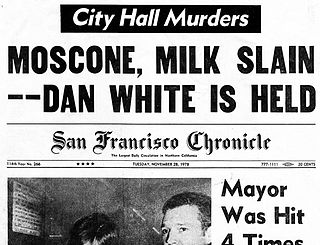
On November 27, 1978, George Moscone, the mayor of San Francisco, and Harvey Milk, a member of the San Francisco Board of Supervisors, were shot and killed inside San Francisco City Hall by former Supervisor Dan White. On the morning of that day, Moscone intended to announce that the Supervisor position from which White had previously resigned would be given to someone else. White, angered, entered City Hall before the scheduled announcement and first shot Moscone in the Mayor's office, then Milk in White's former office space, before escaping the building. Board of Supervisors President Dianne Feinstein first announced Moscone and Milk's deaths to the media, and because of Moscone's death, succeeded him as acting mayor.
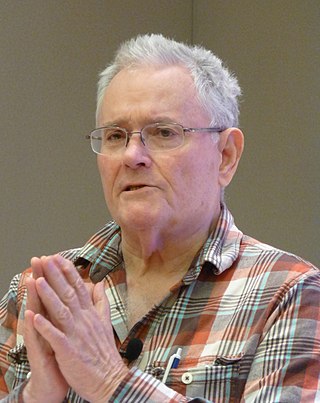
Harry Britt was an American politician and gay rights activist. Born in Texas, he worked as a Methodist pastor in Chicago as a young man and later moved to San Francisco. There, he worked with Harvey Milk until Milk's assassination in 1978. He was appointed to his seat on the San Francisco Board of Supervisors, where he remained until 1993, and served as the board's president from 1989 to 1990. Britt was a Democrat and member of the Democratic Socialists of America. He ran for the United States House of Representatives in 1987 and for the California State Assembly in 2002, but was unsuccessful both times.

The 1994 United States Senate election in California was held November 8, 1994. Incumbent Democratic U.S. Senator Dianne Feinstein won re-election to her first full term. By a margin of 1.9%, this election was the closest race of the 1994 Senate election cycle. This election was the first time ever that an incumbent Democratic Senator from California was re-elected or won re-election to this seat.

The 1977 San Francisco general elections occurred on November 8, 1977, for all 11 newly created electoral districts to be represented in the Board of Supervisors for the 1978 fiscal year, as well as the position of City Attorney, the position of City Treasurer and a roster of 22 propositions. It was the first time in San Francisco's history that Board elections were held on a districted basis rather than on a citywide at-large basis; in the November 1976 general election, voters in San Francisco decided to reorganize supervisor elections to choose supervisors from neighborhoods instead of voting for them in citywide ballots when they voted for Proposition T, which included the definition of the district boundaries.

The 1975 mayoral election was held to select the 37th mayor of San Francisco, and was held in two parts. In the November regular election, then-Speaker of the California State Assembly George Moscone placed first with conservative city supervisor John Barbagelata second and moderate supervisor Dianne Feinstein coming in third. Moscone and Barbagelata thus both advanced to the mandated runoff election in December where Moscone narrowly defeated the conservative supervisor by 4,400 votes, a margin of less than 1%.

The 1983 mayoral election was held to elect the mayor of San Francisco. Incumbent Dianne Feinstein, who had previously been subjected to a failed recall election on April 26, was re-elected to her second and final term as mayor. Feinstein, winning with 80.10%, defeated Cesar Ascarrunz, Gloria E. La Riva, Pat Wright, Brian Lantz, and Carrie Drake.
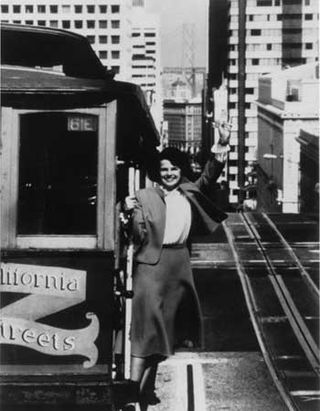
The mayoralty of Dianne Feinstein lasted from November 27, 1978, to January 8, 1988, while she served as the 38th Mayor of San Francisco. Feinstein gained the position following the Moscone–Milk assassinations, in which her predecessor, Mayor George Moscone, was killed by Dan White, a former member of the San Francisco Board of Supervisors. She was formally appointed to the position by the Board of Supervisors by a vote of six to two and inaugurated on December 4, 1978.
The Domestic Partner Task Force was a governmental body established in 1983 by the Californian City of Berkeley's Human Relations and Welfare Commission to draw up the structure of the city's domestic partnership program. Leland Traiman, then the vice-chair of the HRWC and a gay rights activist, was appointed as leader of the Task Force.

The San Francisco District Attorney's Office is the legal agency charged with prosecuting crimes in the City and County of San Francisco, California, under California state law. The current district attorney is Brooke Jenkins. Occupants of this office have gone on to higher elected offices, including: governor of California, United States senator, and vice president of the United States.

The 2018 United States Senate election in California took place on November 6, 2018, to elect a member of the United States Senate to represent California, concurrently with other elections to the United States Senate, elections to the United States House of Representatives, and various state and local elections.

The San Francisco mayoral election of 1971 was held on November 2, 1971, with incumbent Joseph Alioto being re-elected with 38.6 percent of the vote, from among 11 candidates, there being no provision for a runoff.
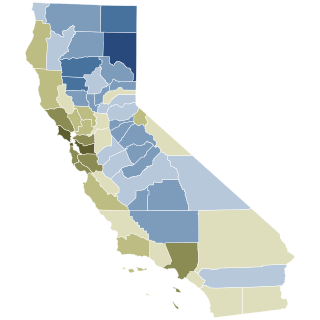
The 2021 California gubernatorial recall election was a special recall election that began in August 2021 and concluded on September 14, 2021, when California voters chose not to recall incumbent Democratic Governor Gavin Newsom, elected for the term January 2019 to January 2023.
Alison M. Collins is a former commissioner of the San Francisco Board of Education. She served on the board from January 7, 2019 until her recall election of February 15, 2022, when she was ousted by 76% of the vote, the largest of all three commissioners recalled on that date. Along with two other commissioners, Collins became the first member of the school board to be recalled in the history of San Francisco, and the first recalled San Francisco official in over a century, since ouster of State Senator Edwin Grant in 1914.
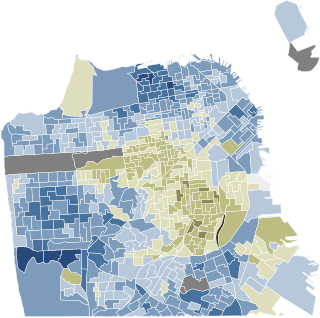
The 2022 San Francisco District Attorney recall election was a successful special recall election to remove San Francisco District Attorney Chesa Boudin from office. It was held on June 7, 2022, concurrent with the 2022 statewide primary elections.

The 2022 San Francisco Board of Education recall elections were held on February 15, 2022. In a landslide election, over two-thirds of voters chose to remove three San Francisco Board of Education Commissioners—Alison Collins, Board President Gabriela Lopez, and Faauuga Moliga—from office. All three commissioners were replaced by appointees chosen by Mayor London Breed. The other four members of the school board were not eligible for recall at this time.














